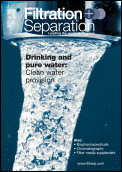
Filtration + Separation
Scope & Guideline
Unlocking Potential in Filtration and Separation Industries
Introduction
Aims and Scopes
- Innovative Filtration Technologies:
The journal emphasizes new developments in filtration technologies, including advancements in materials such as activated carbon, nonwoven fabrics, and membrane technologies that improve filtration performance. - Environmental Sustainability:
A core focus is on sustainable practices in filtration, including the reduction of waste, energy efficiency, and the use of eco-friendly materials to address modern environmental challenges. - Industrial Applications:
The journal covers a wide range of industrial applications of filtration and separation technologies, including water treatment, air filtration, and processes in the chemical and food industries. - Testing and Evaluation Methods:
Research on methodologies for testing and evaluating the performance of various filtration systems is a consistent theme, providing insights into standards and best practices. - Collaborative Research and Innovation:
The journal promotes collaborative efforts within the filtration community, featuring interviews and discussions with industry leaders to foster innovation and share knowledge.
Trending and Emerging
- Advanced Air Filtration Technologies:
There is a growing emphasis on air filtration systems, particularly in light of the increased awareness of air quality issues and health impacts, leading to innovations in filter materials and designs. - Sustainable and Green Filtration Practices:
Research is increasingly focused on sustainable filtration solutions, including the development of biodegradable materials and processes that minimize environmental impact. - Nanofiltration and Membrane Technologies:
Technologies involving nanofiltration and advanced membrane systems are gaining traction, particularly for their applications in water purification and resource recovery. - Smart Filtration Systems:
The integration of smart technologies and Industry 4.0 concepts into filtration systems is becoming a significant theme, emphasizing automation, real-time monitoring, and data analytics. - Filtration for Microplastic Removal:
With rising concerns over microplastics in the environment, there is a marked increase in research focused on filtration technologies specifically designed to address this issue.
Declining or Waning
- Traditional Filtration Methods:
There is a noticeable decrease in publications about conventional filtration methods, as the industry increasingly shifts toward innovative and advanced technologies. - Generalized Water Treatment:
Research on generic water treatment processes appears to be waning, with a more focused approach on specific contaminants and advanced treatment technologies taking precedence. - Single-Use Filtration Solutions:
The trend toward sustainability has led to a decline in interest in single-use filtration products, as researchers and practitioners seek more sustainable, reusable alternatives. - Low-Tech Filtration Solutions:
There is a reduced emphasis on low-tech filtration solutions, as the market demands more sophisticated, high-performance systems that can meet stricter regulatory standards. - Static Filtration Systems:
The focus on static filtration systems is decreasing, as dynamic and automated solutions become more relevant in industrial applications.
Similar Journals
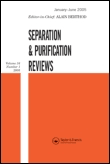
SEPARATION AND PURIFICATION REVIEWS
Championing Open Access to Separation InsightsSEPARATION AND PURIFICATION REVIEWS, published by Taylor & Francis Inc, stands as a leading journal in the fields of Analytical Chemistry and Filtration and Separation, consistently recognized for its high impact and scholarly contributions. With an impressive impact factor reflected in its Q1 and Q2 quartile rankings, this journal serves as an essential platform for researchers, professionals, and students seeking to advance their knowledge and understanding of innovative methodologies in separation science. Covering a broad scope from 1972 to 1995 and from 2003 to 2024, the journal features peer-reviewed articles that influence critical advancements in chemical engineering and analytical techniques. SEPARATION AND PURIFICATION REVIEWS not only fosters collaboration among academics but also encourages discussions surrounding current challenges and innovations in separation processes. With its commitment to providing open access options, this journal ensures that essential findings are readily available to a global audience, thus driving forward the frontiers of separation science.
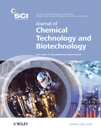
JOURNAL OF CHEMICAL TECHNOLOGY AND BIOTECHNOLOGY
Transforming Ideas into Impactful Solutions in Chemical TechnologyJOURNAL OF CHEMICAL TECHNOLOGY AND BIOTECHNOLOGY, published by WILEY in the United Kingdom, serves as a premier platform for research at the interface of chemical engineering and biotechnology. With an ISSN of 0268-2575 and E-ISSN 1097-4660, this journal has established itself as a crucial resource for scholars and professionals, evidenced by its impactful categorization in the Q1 and Q2 quartiles across multiple domains such as Inorganic Chemistry, Biotechnology, and Renewable Energy. The journal encompasses a broad scope that includes innovative research on sustainable technologies, pollution management, and advances in chemical syntheses, making it essential for those pursuing cutting-edge developments in these disciplines. Researchers and practitioners benefit from its comprehensive coverage, as it includes insightful articles, reviews, and case studies that collectively push the boundaries of contemporary science and engineering. With a ranking of Q2 in its various categories and significant percentiles in key fields, the journal stands as a beacon for high-quality scholarship, eligible for impact in both academia and industry.

Journal of Membrane Science Letters
Connecting Researchers in Membrane ScienceJournal of Membrane Science Letters, published by ELSEVIER, is a premier open-access journal dedicated to advancing knowledge in the fields of membrane science and technology. With an ISSN of 2772-4212, the journal aims to disseminate high-quality research papers, reviews, and short communications that focus on innovative materials, processes, and applications associated with membrane systems. Since its launch in 2021, the journal has quickly established itself as a credible source of information within the scientific community, reflected in its robust quartile rankings: Q2 in Biochemistry and Filtration and Separation, and Q1 in both Materials Science (miscellaneous) and Physical and Theoretical Chemistry. The journal is committed to fostering collaborative research and interdisciplinary studies while providing an accessible platform for researchers and professionals. Its impact factor and growing citation index underscore the journal’s significance in shaping the future of membrane technology and its applications. Located in Amsterdam, Netherlands, the Journal of Membrane Science Letters is a vital resource for those at the forefront of scientific discovery and innovation.
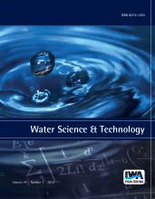
WATER SCIENCE AND TECHNOLOGY
Transforming challenges into solutions in water science.WATER SCIENCE AND TECHNOLOGY, published by IWA PUBLISHING, is a leading academic journal dedicated to advancing the field of water science and technology. With a rich history dating back to 1970, the journal provides a platform for innovative research and technological advancements, catering to the vital challenges faced within the realms of environmental engineering and water resource management. As evidenced by its strong ranking in Scopus, where it holds a position of #86 in Water Science and Technology and #77 in Environmental Engineering, the journal exemplifies significant scholarly contributions, reflected in its Q2 quartile status in both categories as of 2023. Although not an open access journal, WATER SCIENCE AND TECHNOLOGY ensures that its articles are widely available to researchers, professionals, and students passionate about sustainable water solutions. With a continued commitment to excellence, this journal plays a crucial role in shaping the discourse surrounding water quality, conservation, and technology innovation, making it an essential resource for all stakeholders in this critical field.
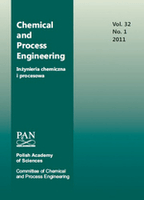
Chemical and Process Engineering-New Frontiers
Pioneering Research for Tomorrow's Chemical SolutionsChemical and Process Engineering-New Frontiers, published by POLSKA AKAD NAUK and the POLISH ACAD SCIENCES, is a premier academic journal dedicated to advancing the frontiers of chemical engineering and chemistry. With an ISSN of 0208-6425 and an E-ISSN of 2300-1925, this journal serves as a crucial platform for disseminating cutting-edge research and innovative practices in the field. Despite its Q4 ranking in both Chemical Engineering and Chemistry categories and a low percentile ranking in Scopus, the journal aspires to enhance visibility and impact in the scientific community through its focus on novel methodologies and groundbreaking studies. Operating as a traditional journal without open access, it aims to connect researchers, professionals, and students, fostering collaboration and knowledge exchange. With a commitment to publishing impactful research, Chemical and Process Engineering-New Frontiers plays an important role in shaping the future of chemical processes and engineering advancements.

Membranes and Membrane Technologies
Elevating Knowledge in Membrane Science and TechnologyMembranes and Membrane Technologies is an innovative journal dedicated to advancing the fields of chemical engineering, chemistry, and materials science through the exploration of membrane science and technology. Published by PLEIADES PUBLISHING INC, this journal offers vital insights into the efficient design, synthesis, and application of membranes across diverse industries, aiming to enhance water treatment, energy generation, and various separation processes. With an ISSN of 2517-7516 and an E-ISSN of 2517-7524, the journal is recognized for its impactful contributions, holding a Q3 category ranking in multiple fields as of 2023. Researchers and professionals will find a wealth of open-access articles that promote the sharing of knowledge and foster collaboration in this rapidly evolving domain. As it converges its mission from 2019 to 2024, Membranes and Membrane Technologies remains an essential resource for those committed to pushing the frontiers of membrane research and application.
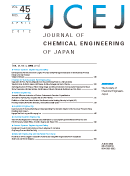
JOURNAL OF CHEMICAL ENGINEERING OF JAPAN
Exploring New Frontiers in Chemical EngineeringJOURNAL OF CHEMICAL ENGINEERING OF JAPAN is a distinguished academic publication in the field of chemical engineering and chemistry, published by Taylor & Francis Ltd. With its ISSN 0021-9592 and E-ISSN 1881-1299, this journal has been a vital resource for researchers and practitioners since its inception in 1968 and continues to provide essential insights and advancements through 2024. The journal operates under an Open Access model as of 2023, promoting wider dissemination of research findings and encouraging collaboration within the global scientific community. Currently categorized in the Q4 quartile for both Chemical Engineering and Chemistry (miscellaneous) in 2023, it ranks within the lower percentiles of its respective fields, offering a platform for emerging scholars to publish their work and gain visibility. As part of Japan's academic landscape, it addresses numerous aspects of chemical engineering, fostering innovation and technical development that contribute to the industry's growth. Engaging with this journal is paramount for those looking to stay informed on the latest research trends and applications in chemical processes.
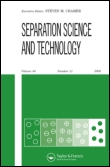
SEPARATION SCIENCE AND TECHNOLOGY
Connecting Scholars in the World of Separation ScienceSEPARATION SCIENCE AND TECHNOLOGY is a distinguished journal published by Taylor & Francis Inc, offering critical insights and advancements in the fields of chemistry and chemical engineering. With an ISSN of 0149-6395 and E-ISSN of 1520-5754, the journal spans a rich history from 1978 to 2024, providing a platform for scholarly articles that delve into innovative separation processes and technologies. Notably recognized in the 2023 category quartiles, the journal ranks Q2 in Chemical Engineering and Chemistry, alongside Q3 in Filtration and Separation and Process Chemistry and Technology, reflecting its significant impact and relevance in these research areas. With an impressive Scopus ranking, including a rank of #10/19 in Filtration and Separation, SEPARATION SCIENCE AND TECHNOLOGY is crucial for researchers and professionals seeking to enhance their understanding of separation techniques and applications. Although it operates under a subscription model, its contributions remain indispensable for the advancement of knowledge and technologies in separation science.

Fibers
Transforming Research into Real-world ApplicationsFibers is a leading peer-reviewed open access journal published by MDPI, focusing on cutting-edge research within the realm of materials science, particularly in the domains of biomaterials, ceramics and composites, and structural engineering. Established in 2013, the journal has gained recognition for its significant contributions to the field, boasting an impact factor that positions it in the Q2 quartile across multiple categories such as Biomaterials, Ceramics and Composites, Civil and Structural Engineering, and Mechanics of Materials as of 2023. With a Scopus ranking that highlights its prominence—such as in the top 20% in Civil and Structural Engineering—the journal fosters an inclusive platform for academic dialogue and technical advancement. Researchers and professionals can access the journal’s comprehensive articles freely, promoting the dissemination of knowledge that is crucial for the advancement of innovative materials and their applications. Situated in Basel, Switzerland, Fibers continues to be an essential resource for those looking to stay at the forefront of research and technology in material sciences.
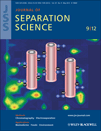
JOURNAL OF SEPARATION SCIENCE
Pioneering Innovations in Analytical ChemistryJOURNAL OF SEPARATION SCIENCE, published by WILEY-V C H VERLAG GMBH in Germany, is a premier platform dedicated to the advancement of knowledge in the fields of analytical chemistry and filtration and separation technologies. With an impact factor that reflects its strong influence—ranking #42 in Analytical Chemistry and #8 in Filtration and Separation—the journal strives to disseminate high-quality research findings from both academia and industry. The journal has established a significant readership, evidenced by its Scopus rankings, and is indexed under ISSN 1615-9306 and E-ISSN 1615-9314. As part of its commitment to accessibility, the journal provides open access options, enabling broader dissemination of innovative research. Since its convergence in 2000 and continuing through 2024, JOURNAL OF SEPARATION SCIENCE has become essential for researchers, professionals, and students aiming to stay at the forefront of separation science methodologies and applications, thereby actively influencing advancements in both theoretical knowledge and practical implementations.